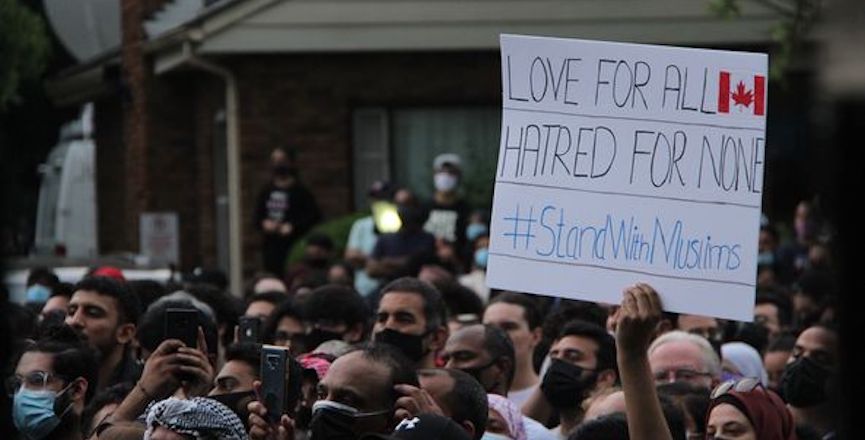Throughout my working life as a Canadian writer, I’ve wondered if it’s possible to create a cohesive national identity without some widely accepted basic content: a language, a mythology, a shared history, a revered cultural inheritance, a cuisine. In general I was dubious, even as claims for a tolerant multiculturalism as Canada’s ID kept growing.
I was influenced by living, in my formative years, in the U.S. and Israel — countries which, like most modern nations, cohered around shared cultural “glues.”
Something beyond hockey and butter tarts. I’m no longer dubious. Yes, I think you can build a hardy national identity with no central content except, paradoxically, the shared commitment to imposing no central content. What persuaded me was the impassioned, energized memorial at a London, Ontario mosque this week, which I attended onscreen. Whether building that kind of national reality is worth the heinous price paid for it is a separate question.
The event was organized and run by a youthful group of Muslim women and men entirely relaxed and in charge, though leaders from every level sat before them. That was a message itself: the creation of this kind of Canada is a historical process that unfolds through generations.
Their parents’ generation came, I’d say, based on the promises of multiculturalism — and were often disappointed and dismayed. (“What my dad didn’t prepare us for,” said one, “was being name-called and having the crap beaten out of us on the way to and from school every day.”) They don’t waste time being surprised, but they’re angry because they know they’re Canadian. They began the memorial with an acknowledgment of Indigenous land claims, since they have the right to apologize for being occupiers, like everyone else.
They’re now attacked mainly on religious grounds versus national, which as a Jew I find ridiculous. I’d call Islam the most universal and accessible of the three “Abrahamic” religions. Any specific charges (misogyny, violence) are absurd, since the major religions are so multifarious that you can find examples of anything and its opposite in all of them. They’re protean.
To state the obvious: these eruptions of hate and carnage are a sign of response to change.
This is not the country it was, and they are not a sign of things getting worse. Rather, the hate is a terrified reaction to things getting better, in the sense of inclusive (or, put neutrally, significant) change. We’ve learned, quite brutally, that there will be a price paid for transforming the meaning of being Canadian, but it’s those who won’t accept the changes who now seem most marginalized. They lurk in the shadows, darting out furtively to murder others who walk in sunlight.
As I say, I’ve long wondered if you can build a society able to help people through hard times on what amounts to the absence of a core culture, since that’s what Canada seems to be trying: accept everyone, impose nothing. (With reasonable exceptions.) In fact at this point, efforts to impose tend to stink of racism and exclusion, like Maxime Bernier’s call for a “values test to screen out potential immigrants who share this barbarian [Islamic] ideology.”
It’s as if there are two main alternatives right now: Trump’s MAGA with its rabid nationalism, or inclusiveness, with Canada, amazingly, a major test case. This has nothing to do with examples of unsuccess or hypocrisy, which abound. It’s about the project and having the commitment and stamina to stick with it.
I talked with some students about it this week. One mentioned the U.S. model, the traditional melting pot, while Canada has the mosaic. But another added that a mosaic isn’t easy — it requires work to fit the pieces together, like a puzzle. I hadn’t thought of that; I always pictured the mosaic as pieces piled atop each other, or strewn about the yard: not as deeply stressful labour.
From the start, it wasn’t going to be easy and was going to be costly. Is it worth it? Only those who pay that cost can really say. It’s not fair that there’s still not justice and perhaps never will be, but progress, such as it is, has always been a matter for collectivities and even the species, not individuals.
Rick Salutin writes about current affairs and politics. This column was first published in the Toronto Star.
Image credit: Andrea Horwath/Used with permission.



